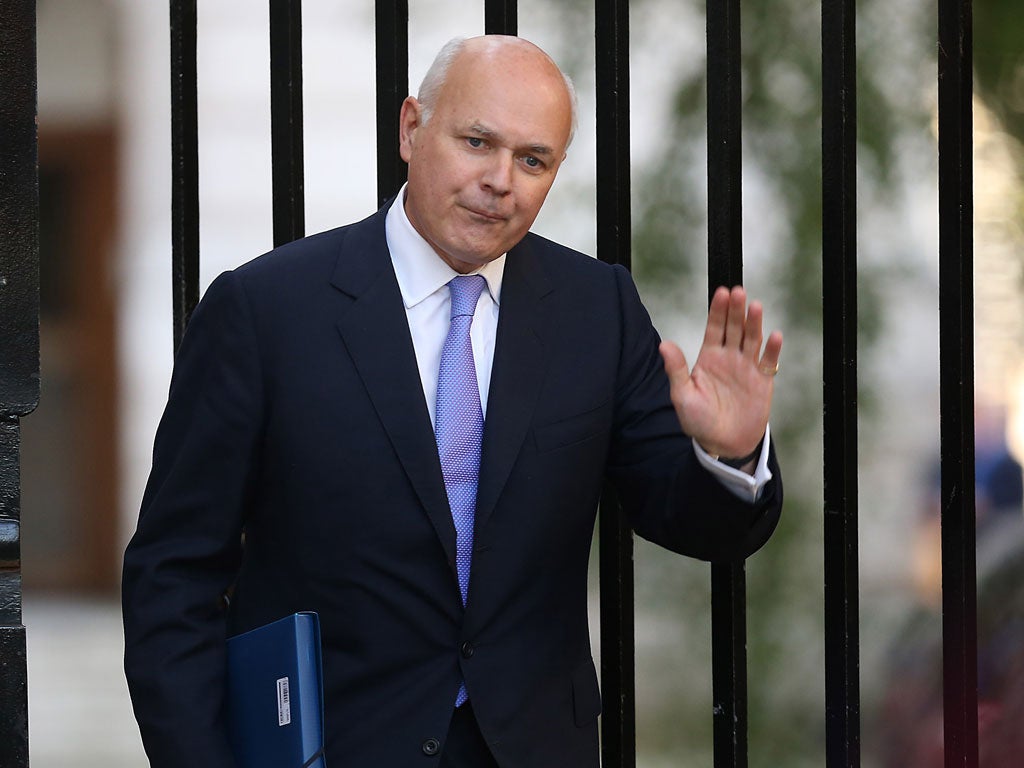Iain Duncan Smith's cynical attempt to redefine child poverty will do nothing to reduce it
Not all modern families are of the two-parent, heterosexual variety that the Work and Pensions Secretary so reveres. And stigmatising those achieves exactly nothing

In a speech two weeks ago, Iain Duncan Smith said something unbelievable. This is nothing unusual - Iain Duncan Smith has said more unbelievable things since he’s joined the Department for Work and Pensions than I own pairs of socks.
It is what he said that had me so upset. He was speaking about families, and he did make some good points.
Outdated
When families are strong and stable, he said quite rightly, so are children. But when things go wrong in families, he added, quite rightly again, the impact on a child’s life can be devastating. It is what he planned to do about it that was so unbelievable. He said that he planned to measure the proportion of children living with the same parents from birth - in order to drive home the message that social programmes should promote family stability and avert breakdown.
As if that point of view was not outdated enough, yesterday Iain Duncan Smith unveiled plans to measure child poverty by how long children have two birth parents looking after them.
So, what’s wrong with that? Well, for a start, when I was taught about poverty, I was told it was measured in food, clothes and shelter. No one ever said anything about birth parents.
There are many wonderful step parents out there who willingly support and love their step-children. They keep them in their fair share of food, clothes and free shelter - and while step-families may not live together from the birth of children, step parents can provide a very good amount of love, support and emotional stability, too. Just as much as any biological, nuclear, traditional family. In some cases, step-families are stronger. Some children find more love and support from a stepparent than they would get from a biological one.
Some children may stop living with one of their biological parents after a family breakdown, but the parent may remain a very important part of their lives and still provide them with a great deal of love and support. Would Iain Duncan Smith really think such children had entered ‘child poverty?’
What about children who are adopted at birth, or in early childhood? They may have been unwanted by biological parents who couldn’t cope, possibly with the strain, or the ‘shame’ of having a disabled child. Yet their adoptive parents may be loving, caring, heterosexual, married millionaires who live in a mansion, buy designer clothes and feed them the best food in the supermarket. Is Iain Duncan Smith really saying he considers such children to be ‘poor?’
Poverty of definition
Consider this, Iain Duncan Smith. Many studies have shown that families with disabled children are more likely to break up. Some parents (particularly, but not always, fathers) of disabled children are unable to deal with their child’s disability.
Some fathers of disabled children choose not to remain a part of the child’s life, and do not support the mother, who is often the child’s carer, in any way.
The most famous example of such a disabled child is Harvey Price, son of Katie. After the end of her relationship with Harvey’s biological father, footballer Dwight Yorke, Katie Price was lucky enough to meet and marry Peter Andre who did (and by all reports still does, even though the marriage has now ended) love Harvey and treat him as his own son. Katie Price is a supermodel and Peter Andre a singer- surely Iain Duncan Smith doesn’t think the son of stars is poor?
There are many more, sadly less famous, disabled children in exactly the same situation as Harvey Price. In some very sad cases, parents die before their children reach adulthood. Is Iain Duncan Smith really suggesting that should this happen in a child’s life, they would enter ‘child poverty,’ even if their living parent remarried someone who was willing and able to provide them with food, clothes and shelter?
Does Iain Duncan Smith really think that a woman who is being physically abused by the man she has married should stay married to such a man ‘for the sake of the children,’ who may well also be being physically abused? Does he not realise that children away from an abusive parent would be richer in love and security, even though the separation might lead to them having basic food, a smaller home and cheaper clothes and possessions?
Had he said instead that children raised by two adults, even two responsible adults, are better off in life, I would have agreed with him. That makes sense to me, and most probably would make sense to a lot of the people who have criticised this proposal.
Based on what he has said, it is easy to understand that Iain Duncan Smith is a supporter of the traditional, two parent, biological, nuclear family. However, the idea of measuring child poverty in birth parents makes absolutely no sense to any sensible person in the 21st century.
The rest of the world still measures poverty in food, clothes and shelter. Would it really be so wrong for Britain to keep doing this?Instead of measuring child poverty by birth parents, why don’t we make "caring, supportive, respected adults" one of our measurements of child wealth? Who knows, Iain Duncan Smith - that might bring child poverty rates down more than you think!
Sarah Ismail is Editor of the Same Difference blog
Join our commenting forum
Join thought-provoking conversations, follow other Independent readers and see their replies
Comments
Bookmark popover
Removed from bookmarks